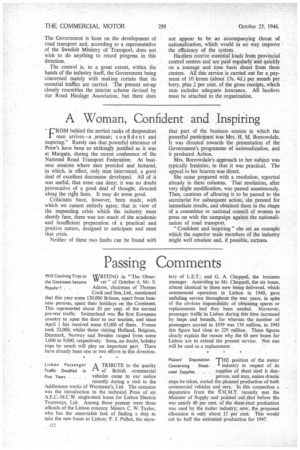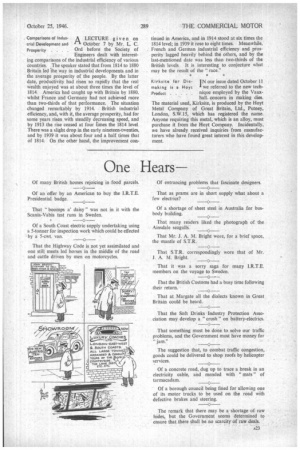Passing Comments
Page 24

Page 25

If you've noticed an error in this article please click here to report it so we can fix it.
Will Coaching Trips to WRITING in "The Obserthe Continent become " ver " of October 6, Mr. S.
Popular ? . . Adams, chairman of Thomas
Cook and Son, Ltd., mentioned that this year some 130,000 Britons, apart from business persons, spent their holidays on the Continent. This represented about 20 per cent. of the normal pre-war traffic. Switzerland was the first European country to open the door to our tourists, and since April 1 has received some 65,000 of them. France took 32,000, whilst those visiting Holland, Belgium, Denmark, Norway and Sweden ranged from some 3,000 to 9,000, respectively. Soon, no doubt, holiday trips by coach will play an important part. There have already been one or two efforts in this direction.
Lisbon Passenger A TRIBUTE to the quality Traffic Doubled In 1-k of British commercial Five Years . . . . vehicles came to our notice
recently during a visit to the Addlestone works of Weymann's, Ltd. The occasion was the introduction to the technical Press of six A.E.C.-M.C.W. single-deck buses for Lisbon Electric Tramways, Ltd. Among those present were three officials of the Lisbon concern: Messrs. C. W. Taylor, who has the unenviable task of finding a ship to take the new buses to Lisbon; F. i Pullen, the secre A22
tary of L.E.T.; and G. A. Chappell, the business manager. According to Mr. Chappell, the six buses, almost identical to those now being delivered, which commenced operation in Lisbon in 1940, gave unPailing service throughout the war years, in spite of the obvious impossibility of obtaining spares or replacements had they been needed. Moreover, passenger traffic in Lisbon during this time increased by leaps and bounds, for whereas the number of passengers carried in 1939 was 134 million, in 1945 this figure had risen to 229 million. These figures clearly explain the reason why the 68 new buses for Lisbon are to extend the present service. Not one will be used as a replacement.
Makers' Deputation THE position of the motor Concerning Sheetindustry in respect of its steel Supplies . . supplies of sheet steel is dan gerous, and may, unless drastic steps be taken, curtail the planned production of both commercial vehicles and cars. In this connection a deputation from the T.M.M.T. recently met the Minister of Supply and pointed out that before the war nearly 40 per cent. of the sheet-steel production was used by the motor industry; now, the proposed allocation is only about 15 per cent. This would cut by half the estimated production for 1947. A LECTURE given on
Prosperity . . .
October 7 by Mr. L. C. Ord before the Society of Engineers dealt with interesting comparisons of the industrial efficiency of various countries. The speaker stated that from 1814 to 1880 Britain led the, way in industrial developments and in the average prosperity of the people. By the latter date, productivity had risen so rapidly that the real wealth enjoyed was at about three times the level of 1814. America had caught up with Britain by 1880, whilst France and Germany had not achieved more than two-thirds of that performance. The situation changed remarkably by 1914. British industrial efficiency, and, with it, the average prosperity, had for some years risen with steadily decreasing speed, and by 1913 the rise ceased at four limes the 1814 level There was a slight drop in the early nineteen-twenties, and by 1939 it was about four and a half times that of 1814. On the other hand, the improvement con
tinned in America, and in 1914 stood at six times the 1814 level; in 1939 it rose to eight times. Meanwhile, • French and German industrial efficiency and prosperity lagged heavily behind the others, and by the last-mentioned date was less than two-thirds of the British levels It is interesting to conjecture what . may be the result of the "race"
Kt rks Ito for DieIN our issue dated October II making is a Hoyt A we referred to the new tech Product nique employed by the Vaux
hall, concern in making dies. The material used, Kirksite, is produced by the Hoyt Metal Company of Great Britain, Ltd., Putney, London, S.W.15, which has registered the name. Anyone requiring this metal, which is an alloy, must purchase it from the Hoyt Company. Incidentally, we have already received inquiries from manufacturers who have found great interest in this development.












































































